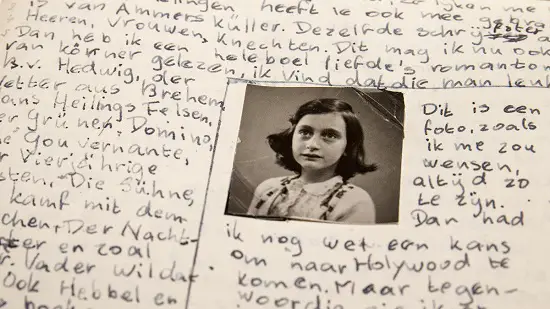| War, persecution, and economic depression affect not only adults, but also old people, children, babies, the sick and the handicapped. |
| Since history is written mostly about politicians, soldiers, intellectuals and criminals, |
| we don’t read very often about how events affect ordinary people. |
| Now and then a special book will shed light on what it was like to live in the midst of terrible events. |
| Such a book is “The Diary of Anne Frank”. |
| Anne Frank was born in Frankfurt am Main, Germany, in 1929. |
| Her father Otto Frank was a businessman who moved the family to the Netherlands in 1934. |
| In Amsterdam, Otto started a company selling pectin to make jams and jellies. |
| Later he began a second company that sold herbs for seasoning meat. |
| Otto Frank had decided to leave Germany because of the policies and personality of the new German Chancellor Adolph Hitler. |
| Hitler had a personal hatred not only for Jewish people but also for everything Jewish. |
| He felt that one way to strengthen Germany and solve its problems was to kill or drive out all the Jews. |
| Hitler also felt that other groups, such as blacks, gypsies, the handicapped, homosexuals |
| and the chronically unemployed should be eliminated. |
| Then only strong healthy “true Germans” would be left. |
| Since Hitler had a plan to solve Germany’s economic problems, he received a lot of popular support. |
| Very few Germans realized that he was mentally and emotionally unbalanced |
| and would kill anyone who got in his way. |
| The Frank family was Jewish, and they felt that they would be safe in the Netherlands. |
| However, in May 1940, Germany invaded the Netherlands and soon took over the government. |
| In 1941, laws were passed to keep Jews separate from other Dutch citizens. |
| The following year, Dutch Jews began to be shipped to concentration camps in Germany and Poland. |
| Just before this began, Anne Frank, Otto’s younger daughter, received a diary for her 13th birthday. |
| Less than a month later, the whole family went into hiding. |
| Otto Frank had made friends with the Dutch people who worked with him in his business operations. |
| Now these friends were ready to help him, |
| even though hiding Jews from the authorities was treated as a serious crime. |
| Behind Otto Frank’s business offices, there was another house that was not visible from the street. |
| Here the Franks moved many of their things. |
| Only a few trusted people knew they were living there. |
| The Franks moved into these small rooms on July 6, 1942, |
| and they lived there with another Jewish family, the Van Pels, |
| until the police captured them on August 4, 1944. |
| So, for more than two years, the two families never went outside. |
| All their food and supplies had to be brought to them. |
| During this period, Anne Frank told her diary all of her thoughts and fears. |
| Like any teenage girl, she hoped that good things would happen to her, |
| that she would become a writer or a movie star. |
| She complained that her parents treated her like a child. |
| She insisted that she was grown up. |
| She also talked about how difficult it was to live in a small area with seven other people and not to be able to go outside. |
| She wrote about the war and hoped the Netherlands would soon be liberated from the Germans. |
| Anne sometimes envied her older sister, Margot, who was so much more mature, and who never got into trouble. |
| She and Margot wrote letters to each other to pass the time. |
| Anne even had a romance with Peter van Pels, who was seventeen. |
| Then all their fears came true. |
| All the eight Jews hiding in the house were arrested and eventually sent to Auschwitz death camp in Poland. |
| Although the war was ending, it did not end soon enough for the Frank family. |
| Only Otto Frank survived the war. |
| One of their helpers, Miep Gies, saved Anne’s diary and kept it. |
| After the war, Otto Frank decided to publish it. |
| Since 1947 more than 20 million copies have been sold in 55 languages. |
| Anne’s diary shows the terrible cost of hatred, persecution and war better than any history book. |
Subscribe
0 Comments
Oldest





